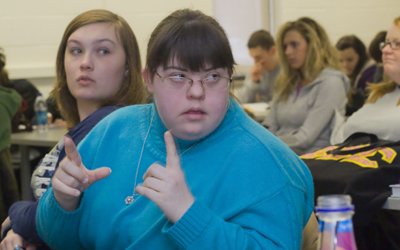Intellectually disabled students to get 4-year career development program

Megan Rothermel signs her mother a question during a class. Megan is a student in the Campus Transition Project, an educational program for people with intellectual disorders. Photo by Coty Giannelli.
January 25, 2011
Adults with intellectual disabilities will soon have a place to call home at Kent State.
The university is now one of 27 schools in the country developing a four-year, non-degree college program for students with intellectual disabilities.
“This has been a long-standing dream for a lot of them,” said Bob Baer, project director for the program called Career and Community Studies.
60 percent of students with disabilities want to go to college, Baer said, and less than one quarter of those students actually become independent.
That’s why he and his team are in the process of recruiting 20 adults with intellectual disabilities as ambassadors to go through CCS beginning next summer.
Students must be between 18 and 22 years old and “socially graduated” from high school, meaning they completed graduation requirements but did not receive a diploma.
By not officially graduating, they can stay in high school and receive the benefits of busing and teaching assistants until they are 22.
Any student interested in the program must complete an application process, including a written application and an interview. Baer said project directors would then choose 20 students whose feedback will help them build an appropriate curriculum.
Application process for students with intellectual disabilities:
- Contact Project Director Vonnie Michali at 330-672-0729
- Take a tour of the campus
- Fill out a written application
- Schedule an interview with the directors of CCS
“It’s like a support team,” said Megan Rothermel, a 22-year-old with Down syndrome. Megan will serve as a junior leader for the 20 selected students, working with them as they go through classes.
She initially went through a similar pilot program, the Campus Transition Project. The project brought in 15 intellectually disabled adults, ages 18 to 22, beginning in 2009. They met Monday through Thursday mornings for one year. Each student took a Career and Life Skills course and participated in various on-campus activities to better prepare them for the workforce.
The main goal was to improve their quality of life and give them the tools to do the things they hope to do, said Project Director Vonnie Michali.
The university saw the success of the Campus Transition Project and decided to develop a four-year version, Baer said.
Career and Community Studies will consist of three parts; the goal being preparing students for a job they’re interested in. The first section will focus on academics. Baer said students would attend regular classes along with a homeroom with others in the program.
They will also participate in career and technical education courses to make sure they are knowledgeable in the basics of reading and writing. Baer said graduate students in the School of Lifespan Development would help them with their classes.
The second aspect of the curriculum will assist students in getting jobs related to their career interests. They’ll start with employment on campus and then ultimately find a job close to where they want to live, Baer said.
“One of those ultimate objectives is that they will find employment¬—and not just any employment—but in a field they’re interested in,” Michali said.
Students from rehabilitation, career and technical education and special education will work with the students with intellectual disabilities to develop their working skills.
The last part of CCS is independent living. Intellectually disabled students will eventually be able to live in the College of Education residence halls with other Kent State students. Baer said undergraduate education students would be paid to mentor an intellectually disabled student.
“That group will be very important because we see undergraduate students as being mentors for these folks,” Baer said.
The goal is for them to have the opportunity to really participate in the social life of Kent State. Baer said he hopes they will go to football games and attend other social events available for everyone.
The first 20 students going through the trial program won’t pay anything; however, when the program becomes official, all students in the CCS program will pay tuition.
To cover program development costs, the university agreed to put up 25 percent. The rest came roughly two months ago from the National Department of Higher Education in the form of grants, Baer said.
Before CCS can become official, Baer said it must meet federal standards. The university will make changes in admissions, accreditation, faculty training, career training, independent living arrangements and many other aspects of campus life.
But the project directors are hard at work to complete the preparations so these students can start training for jobs of their interest, Baer said.
DeeOndra Rothermel, Megan’s mother, said she thinks it’s often difficult for employers to look past an intellectual disability. She sees these programs as a way to overcome the skepticism.
“Now, graduating high school is not a dead end,” Rothermel said.
Megan’s future now looks much brighter because of the programs, she said.
“As far as preparing herself for her future and being able to support herself,” DeeOndra said, “this has made a big difference.”
Michali said she hopes other universities will eventually follow Kent State’s lead.
“Ultimately, when we get through, there will be other universities that will say ‘Show us what you’re doing and let’s provide more opportunities for more students across the United States.’”
Contact Kelsey Misbrener at [email protected].












